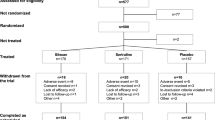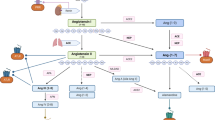Abstract
The effect of pretreatment with ritanserin, a potent and selective serotonin-S2 (5-HT2) receptor antagonist, on the prolactin (PRL) response to electroconvulsive therapy (ECT) was studied in seven female patients suffering from major depressive disorder. They were given either ECT alone, or ECT after 10 or 20 mg ritanserin PO, and PRL was estimated in blood samples taken at times −5, 0, +5, +15, +30 and +60 min. The PRL responses after drug administration were not different from the responses after ECT alone. We conclude that, if serotonergic mechanisms are involved in the ECT-induced PRL increase, this neuroendocrine response seems to be rather a 5-HT1 than 5-HT2 receptor mediated event.
Similar content being viewed by others
References
Charig EM, Anderson IM, Robinson JM, Nutt DJ, Cowen PJ (1986)l-Tryptophan and prolactin release: evidence for interaction between 5-HT1 and 5-HT2 receptors. Hum Psychopharmacol 1:93–97
Essman WB (1986) Effect of electroconvulsive shock on serotonin activity. Ann NY Acad Sci 462:99–104
Falashi P, Rocco A, Marini S, Delitala G, Melis GB (1985) The implication of serotoninergic system in the control of prolactin secretion. 4th Capo Boi Conference on Neuroscience, Villasimius, Sardinia, Italy
Graham-Smith DG, Green AR, Costain DW (1978) Mechanism of antidepressant action of electroconvulsive therapy. Lancet I:254–256
Idzikowski C, Mills FJ, Glennard R (1986) 5-Hydroxytryptamine-2 antagonist increases human slow wave sleep. Brain Res 378:164–168
Idzikowski C, Cowen PJ, Nutt D, Mills FJ (1987) The effects of chronic ritanserin treatment on sleep and the neuroendocrine response tol-tryptophan. Psychopharmacology 93:416–420
Krulich L, McCann SM, Mayfield MA (1981) On the mode of the prolactin release-inhibiting action of the serotonin blockers metergoline, methysergide and cyproheptadine. Endocrinology 108:1115–1124
Langer SZ, Sechter D, Loo H, Raisman R, Zarifian E (1986) Electroconvulsive shock therapy and maximum binding of platelet tritiated imipramine binding in depression. Arch Gen Psychiatry 43:949–953
Leysen JE, Gommeren W, van Gompel P, Wynants J, Janssen PFM, Laduron PM (1985) Receptor-binding properties in vitro and in vitro of ritanserin, a very potent and long acting serotonin-S2 antagonist. Mol Pharmacol 27:600–611
Maj M, Mastronardi P, Cerreta A, Romano M, Mazzarella B, Kemali D (1988) Changes in platelet3H-imipramine binding in depressed patients receiving electroconvulsive therapy. Biol Psychiatry 24:469–472
Papakostas Y, Markianos M, Stefanis C (1988) Methysergide reduces the prolactin response to ECT. Biol Psychiatry 24:465–468
Swartz CM, Abrams R, Drews V (1988) Serotonin and electroconvulsive shock-induced prolactin release. Convulsive Ther 4:141–145
van Peer A, Woestenborghs R, Heykants J, de Coster R, Gelders Y, Hoppenbrouwers M-L, Reyntjens A (1984) Oral bioavailability of R 55 667 in healthy volunteers — preliminary results and determination of prolactin plasma levels. Clinical Research Report on R 55 667/2
Whalley LJ, Eagles JM, Bowler GMR, Bennie JG, Dick HR, McGuire RJ, Fink G (1987) Selective effects of ECT on hypothalamic-pituitary activity. Psychol Med 17:319–328
Zis AP, Manji HK, Remick RA, Grant BEK, Clark CM (1989a) Effect of the 5-HT2 antagonist ketanserin on the ECT-induced prolactin release. Biol Psychiatry 26:102–106
Zis AP, Remick RA, Clark CM, Grant BEK, Brown GM (1989b) Blockade of the postictal prolactin surge by methysergide. Arch Gen Psychiatry 46:385–387
Author information
Authors and Affiliations
Rights and permissions
About this article
Cite this article
Papakostas, Y., Markianos, M., Papadimitriou, G. et al. Ritanserin, a 5-HT2 receptor antagonist, does not modify ECT-induced prolactin release. Psychopharmacology 100, 206–208 (1990). https://doi.org/10.1007/BF02244407
Received:
Revised:
Issue Date:
DOI: https://doi.org/10.1007/BF02244407




